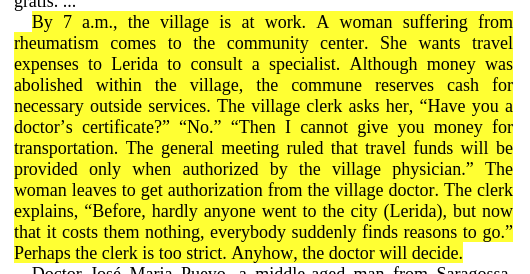There& #39;s a figure once again going around claiming anarchist collectives in spain saw a 20% increase in productivity. This is way too simple of an account and doesn& #39;t really apply to the industrial or urban sector, so I thought I& #39;d do a quick thread giving an overview.
Rural collectives 1) were sincerely popular and net liberatory, 2) rapidly pushed out independent farming due to company-town monopsony effects, 3) got serious gains in agricultural production from economies-of-scale, 4) weren& #39;t that anti-authoritarian, 5) required wider markets.
That sites of production that don& #39;t require complex production chains --eg farms & fisheries -- can be turned into communes is longstanding historic record. What is noteworthy is the authoritarian, parochial, and paternalistic democratic administration.
There& #39;s plenty of accounts of the rural collective councils doing shit like "The elders will vote on whether you getting a bus to the city to go to a movie is a vice."
One example of how shit was playing out:
One example of how shit was playing out:
Some industrial cooperatives saw serious improvements, for many of the incentive & knowledge reasons cooperatives > capitalism.
Plus the revolution allowed rapid economic restructuring in a depression that could fix misallocation faster than seized up capitalist markets.
Plus the revolution allowed rapid economic restructuring in a depression that could fix misallocation faster than seized up capitalist markets.
The successful collectivizations in industrial anarchist spain were less collectivist than mutualist. Workers seized their workplaces & turned them into cooperatives that continued on the market. Many private small businesses continued competing alongside. Overall costs declined.
However the main discourse in communist accounts is response to *declines* in urban productivity & the refusal of workers to equalize wages + abolish market relations. These are related because many workers making higher wages chose to work less and many refused to work for free.
This deviation from communism caused ideological pushes to remove market dynamics, which invariably fell on their faces. This is related to a plague of materials shortages, irrational over-production (sitting in warehouses because disconnect from supply & demand), & unemployment.
Some challenges were temporary: workers took a second to learn accounting and marketing once they had control
some were broader: global depression, refugee crisis, hostile protectionism by state regimes
others were ideological: price controls and suppression of black markets.
some were broader: global depression, refugee crisis, hostile protectionism by state regimes
others were ideological: price controls and suppression of black markets.
One particularly annoying consequence of syndicalism was a tendency towards the construction of de facto guilds across entire industries, removing competition between workplaces & spreading monopsony dynamics whereby certain guilds of workers gained at the detriment of consumers.
This is in no way to sneer at the revolution and the noble struggle against fascism or misidentify the CNT & its syndicalist foibles and government-collaborationism as representative of the spanish anarchist movement. Nor should we discount the massive gains made for many workers
The revolution was a brilliant and inspiring stand by the world against the horrors of fascism. It was the product of decades of struggle by heroes on the ground on countless fronts. It was a decentralized, multiplicitous, complex affair containing steadfast anarchist tendencies.
In many regards that anarchists today largely refuse to accept or speak of, anarchist spain embraced and utilized markets. Whenever some ideologue is confident they can abolish markets & money, I love showing all the currencies that anarchist collectivists were forced to turn to.

 Read on Twitter
Read on Twitter


